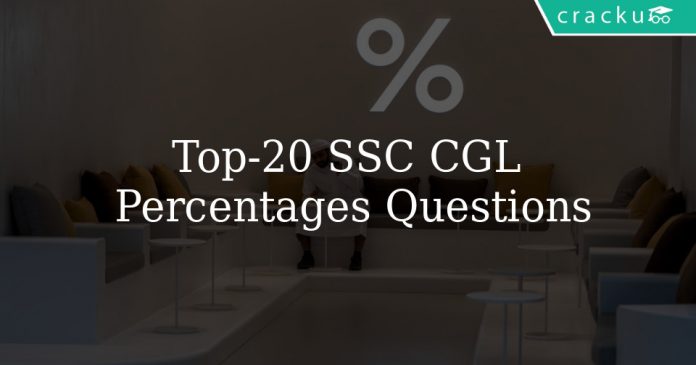SSC CGL Percentage Questions
Download Top-20 Percentage Questions for SSC CGL exam 2020. Most important Percentage Questions based on asked questions in previous exam papers for SSC CGL.
Download Top-20 SSC CGL Percentages Questions
Get 125 SSC CGL Mocks – Just Rs. 199
Take a free SSC CGL Tier-1 mock test
Download SSC CGL Tier-1 Previous Papers PDF
Question 1: If A’s income is 50% less than that of B’s, then B’s income is what per cent more than that of A?
a) 125
b) 100
c) 75
d) 50
Question 2: 1.14 expressed as a per cent of 1.9 is
a) 6%
b) 10%
c) 60%
d) 90%
Question 3: If 60% of A = 48% of B, then A:B is
a) 9:20
b) 20:9
c) 4:5
d) 5:4
Question 4: Two successive price increase of 10% and 10% of an article are equivalent to a single price increase of
a) 19%
b) 20%
c) 21%
d) 22%
Question 5: The average of odd numbers upto 100 is
a) 50.5
b) 50
c) 49.5
d) 49
Question 6: If A’s income is 25% less than B’s income, by how much per cent is B’s income more than that of A ?
a) 25
b) 30
c) 100/3
d) 50
Question 7: If on a marked price, the difference of selling prices with a discount of 30% and two successive discounts of 20% and 10%is Rs. 72, then the marked price (in rupees) is:
a) 3,600
b) 3,000
c) 2,500
d) 2,400
Question 8: If an electricity bill is paid before due date, one gets a reduction of 4% on the amount of the bill. By paying the bill before due date a person got a reduction of Rs. 13. The amount of his electricity bill was:
a) Rs. 125
b) Rs. 225
c) Rs. 325
d) Rs. 425
Question 9: Successive discounts of 10%, 20% and 30% is equivalent to a single discount of:
a) 60%
b) 49.6%
c) 40.5%
d) 36%
Question 10: The price of an article was first increased by 10% and then again by 20%. If the last increased price be IRS. 33, the original price was:
a) Rs. 30
b) RS. 27.50
c) Rs. 26.50
d) Rs. 25
Join Exam Preparation Telegram Group
Question 11: If each side of a square is increased by 10%. its area will be increased by:
a) 10%
b) 21%
c) 44%
d) 100%
Question 12: If the length of a rectangle is increased by 10% and its breadth is decreased by 10%, the change in its area will be:
a) 1% increase
b) 1% decrease
c) 10% increase
d) No change
Question 13: A is 50% as efficient as B. C does half of the work done by A and B together. If C alone does the work in 20 days, then A, B and C together can do the work in
a) 17/3days
b) 20/3days
c) 6 days
d) 7 days
Question 14: The cost price of an article is Rs. 800. After allowing a discount of 10%, a gain of 12.5% was made. Then the marked price of the article is
a) Rs. 1,000
b) Rs. 1,100
c) Rs. 1,200
d) Rs. 1,300
Question 15: A man bought an article listed at Rs. 1500 with a discount of 20% offered on the list price. What additional discount must be offered to man to bring the net price to Rs. 1,104?
a) 8%
b) 10%
c) 12%
d) 15%
Get 125 SSC CGL Mocks – Just Rs. 199
Question 16: When the price of an article was reduced by 20% its sale increased by 80%. What was the net effect on the revenue?
a) 44% increase
b) 44% decrease
c) 66% increase
d) 66% decrease
Question 17: The price of sugar goes up by 20%. If a housewife wants the expenses on sugar to remain the same, she should reduce the consumption by
a) 76/5%
b) 50/3%
c) 20%
d) 25%
Question 18: In a factory 60% of the workers are above 30 years and of these 75% are males and the rest are females. If there are 1350 male workers above 30 years, the total number of workers in the factory
a) 3000
b) 2000
c) 1800
d) 1500
Question 19: The marked price of an item is Rs. 480. The shopkeeper allows a discount at 10% and gains 8%. If no discount is allowed, his gain percent would be
a) 18%
b) 18.5%
c) 20.5%
d) 20%
Question 20: A man sold 20 apples for Rs. 1000 and gained 20%. How many apples did he buy for Rs. 1000?
a) 20
b) 22
c) 24
d) 25
More SSC CGL Important Questions and Answers PDF
Answers & Solutions:
1) Answer (B)
Let’s say B’s income is 100
Hence A’s income will be 50
Now B’s income is 50 more than A’s
Hence it is $\frac{50}{50}\times100$ percent ($\frac{d}{Ai}\times100$ where d is difference in income and Ai is A’s income) more than A’s
2) Answer (C)
Let’s say 1.14 is $x$ percent of 1.9
hence 1.14 = $\frac{1.9\times x}{100}$
$x$ will be 60
3) Answer (C)
Given 60% of A = 48% of B
Hence A:B = 48 : 60
or A:B = 4 : 5
4) Answer (C)
Let’s say price of article is 100
After first increase its price will be 100(1+ $\frac{10}{100}$) = 110
Now second increment will be applied on 110
Hence new price will be 110(1+ $\frac{10}{100}$ ) = 121
Which is 21 more than before any increment
Hence total percentage increment = 21
5) Answer (B)
Require sum of 1+3+5+7+9….99
Applying formula for summation of n digits with a as first digit and d is the difference
sum = $\frac{n}{2} (2a + (n-1) d)$
or this formula can be reduced to $\frac{n}{2} \frac{a + l}{2} $hence for calculating avg. it will be
$\frac{a + l}{2}$ (where $l$ is last term)
so $\frac{1 + 99}{2}$ = 50
6) Answer (C)
let’s say B’s income is 100
A’s income will be 75
B’s income is 25 greater than A’s
hence B’s income is $\frac{25}{75} \times 100$ percent more than A’s
7) Answer (A)
let’s say marked price 100
so for first discount of 30% selling price will be 70
and for two successive discounts of 20% and 10% selling price will be 72 and difference will be 2
now when difference between both selling prices is 2, marked price is 100
so when difference between both selling prices is 72, marked price will be $\frac{100}{2} \times 72$ = 3600
8) Answer (C)
let’s say amount of electricity bill is 100
so reduction will be 4
hence when reduction is 4 amount of electricity bill is 100
now when reduction is 13 amount of electricity bill will be $\frac{100}{4}\times 13$
9) Answer (B)
We can assume that discount is on a price of 100
so after first discount of 10% its value will be = 90
now after second consecutive discount of 20% its value will be $90(1-\frac{20}{100})$=72
and after third consecutive discount of 30% its value will be $72(1-\frac{30}{100})$=50.4
hence it is a equivalent to a single discount of 100-50.4=49.6
10) Answer (D)
Let’s say its original price is 100
hence after first increment of 10% its value will be 110.
and after second consecutive increment of 20% its value will be 132
so when its value becomes 132 , original price is 100
now when its value becomes 33 , original price will be $\frac{100}{132} \times 33$
11) Answer (B)
Let’s say side of square is 100 unit
its area will be $10^{4} unit^{2}$
after 10% increment its value will be 110 unit
and area will become $1.21 \times 10^{4} unit^{2}$
change in area $ .21 \times 10^{4} unit^{2}$
percentage change will be 21
12) Answer (B)
let’s say length is 100 and width is also 100 hence area will be $10^{4}$ $unit^{2}$
after 10% increase, length will be 110 and 10% decrease in width, it will be 90 and area will be 9900 $unit^{2}$
%change in area will be = $\frac{100}{10000}\times100$ = 1%
13) Answer (B)
C does $\frac{1}{20}$ amount of work in a day.
And A+B do twice of work as much done by C or A+B=2C or $\frac{2}{20}$.
So A+B+C together will do $\frac{2}{20}+\frac{1}{20}=\frac{3}{20}$ amount of work in a day.
And complete work will be done in $\frac{20}{3}$ days.
14) Answer (A)
Having a gain of 12.5%, selling price will be $800 \times \frac{112.5}{100} = 900$
So after having a discount of 10% on marked selling price is 900
Hence marked price will be = $900 \times \frac{100}{90} = 1000$
15) Answer (A)
After having 20% discount price will be = $1500 \times \frac{80}{100}$ = 1200
So for net price of 1104 discount should be 1200-1104 = 96
%discount = $\frac{96}{1200} \times 100$ = 8%
Get 125 SSC CGL Mocks – Just Rs. 199
18000+ Questions – Free SSC Study Material
16) Answer (A)
Let’s initial price is $x$, and sale is $y$ so revenue will be $xy$
After having discount of 20%, initial price will be $\frac{80x}{100}$ and sale will be $\frac{180y}{100}$ , hence new revenue is $1.44xy$.
Increment in revenue will be $0.44xy$ i.e. equal to 44%
17) Answer (B)
Initial price $x$ (say) and consumption is $y$ , hence expense will be $xy$.
After price increment price is $\frac{120x}{100}$ and expense should remain $xy$.
Hence $\frac{120x}{100} \times N=xy$ (where N is new expense)
$ N=\frac{100y}{120} $
Decrement in consumption is=$\frac{20y}{120}$ or $\frac{50}{3}$ %
18) Answer (A)
Let’s say total number of workers are $x$.
Hence above 30 years workers will be $\frac{60x}{100}$
And male workers will be $\frac{60x}{100} \times \frac{75}{100}$ = 1350 (given)
So x will be = 3000.
19) Answer (D)
Marked price = 480
discount = 10%
Selling price = 480 – $\frac{480 \times 10}{100}$ = 432
Gain = 8%
Cost price = $ 432 \times (\frac{100}{108})$ = 400
After no discount ,gain will be = 480-400 = 80
Percentage gain = $\frac{80}{400} \times 100$ = 20%
20) Answer (C)
Selling price of 20 apples = 1000
gain = 20%
Cost price of 20 will be = $\frac{1000 \times 100}{120} = \frac{2500}{3}$
So on cost price of 1000 amount of apples will be = $\frac{20 \times 3}{2500} \times 1000$ = 24
Join Exam Preparation Telegram Group





